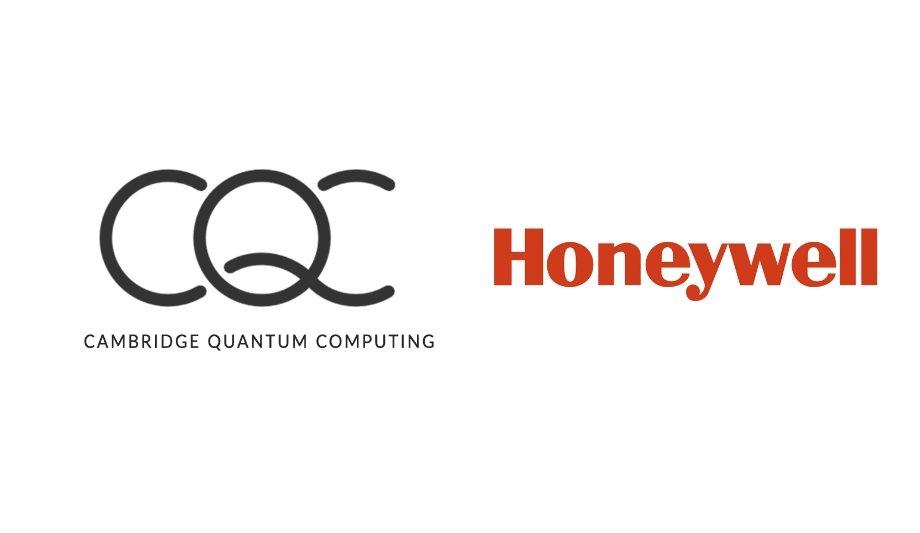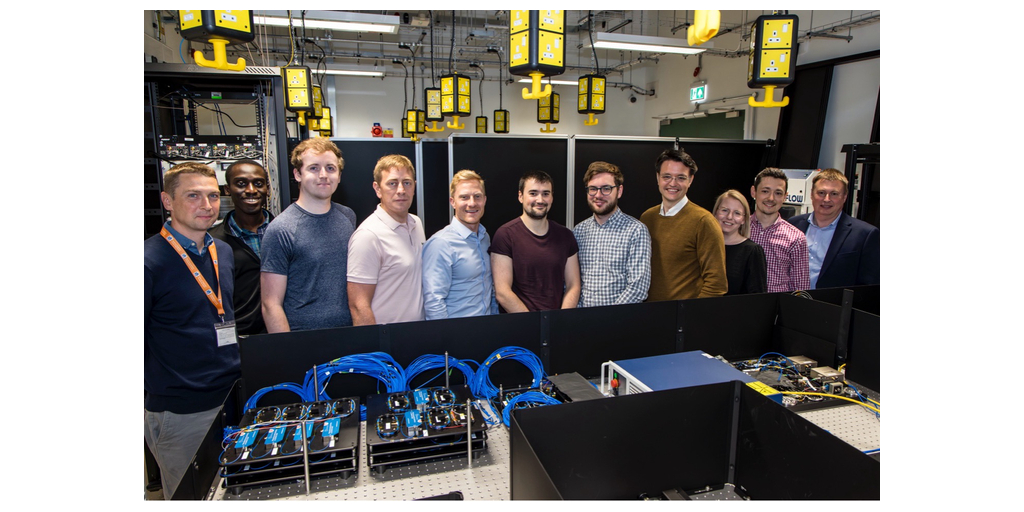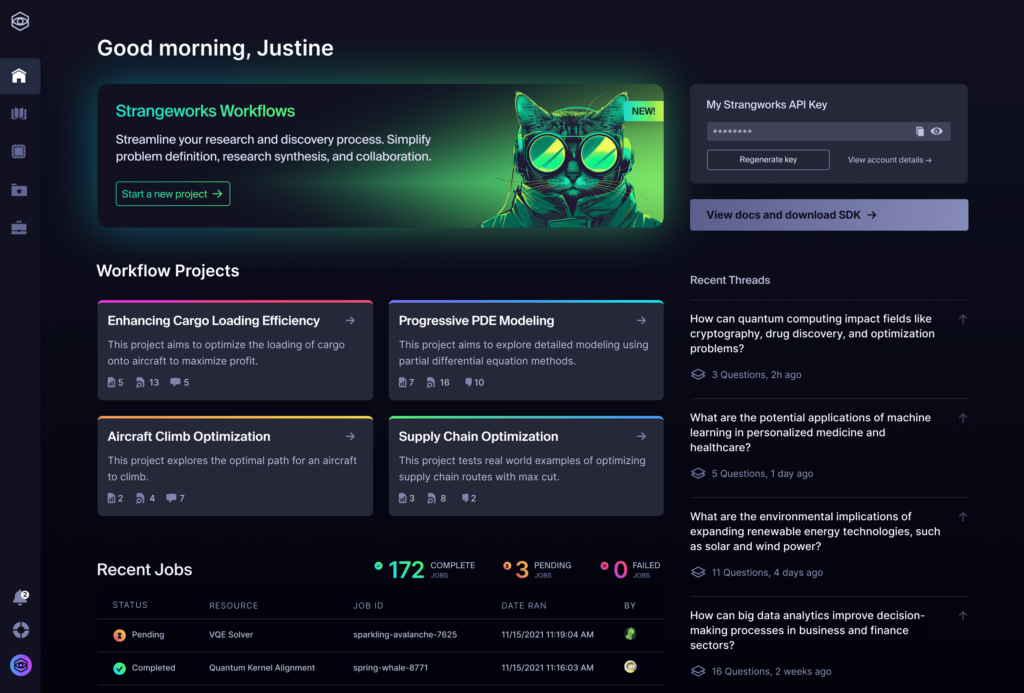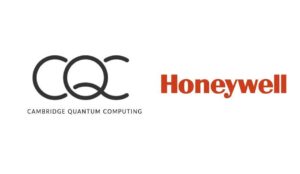
In quantum mechanics, entanglement means two or more qubits become a single quantum state, a state which offers vastly more power to probe computational possibilities than in the qubits’ previously separated state when coaxed into being by researchers and quantum computing programmers.
Described variously as a merger and as a business combination, the recent news that Honeywell Quantum Solutions and Cambridge Quantum have become a single company might better be described as a quantum entanglement of two pioneering organizations, creating a new company that will tap nearly unlimited scientific and commercial possibilities.
The move, announced June 8, will bring together leaders in quantum hardware and software. Honeywell Quantum Solutions (HQS) is a pioneer in ion-trap quantum computer development and Cambridge Quantum has been in the forefront of the creation of quantum software and the commercialization of quantum technology.
During a joint interview, Ilyas Khan, CEO and founder of Cambridge Quantum and future CEO of the newly formed company and Tony Uttley, currently the president of HQS, who will serve as the new company’s president, agreed that the integration of hardware and software just touches the surface of the new company’s potential.
It is clear that the merger is inherently designed to offer quantum hardware and software solutions with unmatched performance and do so more efficiently and at scale globally. But, for Khan, this new firm can also serve as a standard bearer in global business, something that could push quantum — which some consider an emerging field and others an interesting business curiosity — into a fully formed industry delivering real solutions to the world’s biggest challenges, while doing so in the right way.

“I’m excited that we can become an exemplar in the quantum industry as we also become the center of gravity for the ecosystem.”
“I’m excited that we can become an exemplar in the quantum industry as we also become the center of gravity for the ecosystem,” said Khan. “And I think that if, indeed, quantum computing and quantum technologies is the next Industrial Revolution, which is what many of us believe, then I think that I’d like us to be the exemplar of how to do this correctly.”
Uttley agreed, calling it an inflection point for the company and the industry.
“This has the potential to become that inflection point in a new technology; the moment when we can harness what might be possible,” said Uttley. “The benefits of quantum to humankind really are that important and we want to have this new company be an accelerator to show how quantum computing can create value. That’s what makes me super excited, makes me smile every time I wake up in the morning and say, ‘Hey, we’re really gonna do this.’”
Both leaders see the creation of this firm — which is described as the largest, most advanced standalone quantum computing company in the world — not as a company that’s going to eat the quantum ecosystem, but as one that will feed it.
“This new entity really is about collaboration,” said Uttley.
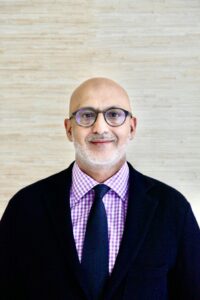
Khan realizes that the new company — which will contain a hardware agnostic software division — will be closely watched and must emphasize integrity, collaboration and leadership.
“We’ve got to show by our actions that everybody’s welcome,” said Khan. “We will support the smaller companies, we will support the bigger companies, we will make tket (CQ’s quantum software development kit) open access, we will not restrict people. If another hardware company is working with our software division, that information is sacrosanct. “
The leaders are excited about the possibilities to deliver real value in quantum right now. Quantum cybersecurity, which Cambridge Quantum has already developed and is commercializing, appears to be the combined venture’s first wave of quantum products to hit the market.
“What I might be most excited about is having real, near-term value-creating offerings coming out of quantum computers.”
“What I might be most excited about is having real, near-term value-creating offerings coming out of quantum computers,” said Uttley “We have to remember that the market for quantum computing applications doesn’t yet exist. And most companies don’t fully understand how to use quantum computing. One of the things we’re going to go do is help develop the market itself, to really support customers understanding of how they can make use of quantum computing.”
More products — quantum machine learning and quantum artificial intelligence, as well as quantum chemistry — are in the offing, as well.
For Khan, one of the most exciting long term developments that could be accelerated by the merger is Quantum Natural Language Processing (QNLP), a technology that Cambridge Quantum has established a leadership position in and staffs with a robust group of world-renowned QNLP scientists including Professor Bob Coecke and recently hired Steve Clark (who joined from Deep Mind).
Cambridge Quantum’s scientists are probing the use of quantum algorithms to understand language, which could give rise to machines that can naturally understand human language.
“In terms of product rollout, my vision is that we have immediate, intermediate, longer term,” said Khan. “and we are the leaders in each field, but critically, that leadership includes Quantum AI – for many the holy grail, which is exemplified by quantum natural language processing. If you solve that (meaning QNLP), then this new industrial revolution becomes real. I believe our newly merged company will speed up Cambridge Quantum’s path to deliver grammar-aware quantum natural language processing to the world.”
Grammar-aware machines could lead to better elder care, smart voice assistants and improved telemedicine, just to name a few possible QNLP-powered innovations.
“We are working on projects to help discover and create a compound or material that will efficiently and effectively sequester carbon. Separately, we want to be pivotal in helping to solve Alzheimer’s, and we have active research projects in the battery area – all of which gain substantially by the merger.”
While Khan considers QNLP an exemplar of Quantum AI, there are other bold initiatives that emphasize the combined teams’ drive to leverage quantum computing to solve the world’s biggest challenges, such as confronting climate change and improving health.
“There are five or six projects that are truly huge on a global scale, which are in the material science area,” said Khan. “We are working on projects to help discover and create a compound or material that will efficiently and effectively sequester carbon. Separately, we want to be pivotal in helping to solve Alzheimer’s, and we have active research projects in the battery area – all of which gain substantially by the merger.”
CQ has also made advances in financial technology, such as using a quantum algorithmic approach to Monte Carlo modeling.
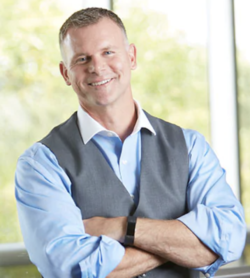
On the hardware side, Uttley expects continued progress in its QC approach to match these software applications and more.
“While this new organization affords us the opportunity of working collaboratively with other hardware manufacturers, we are going to continue to do our best to increase the capability — as fast as we possibly can — on our version of trapped ion quantum computers to make it highly useful in these different application spaces,” said Uttley. “In addition to executing against our roadmap for releasing consecutive generations of higher performing universal quantum computers, we are also going to be able to re-architect at the trap level to do application-specific outcomes in areas such as chemistry and materials. There are going to be places that, because we can have that full — from fingertip to metal — interaction, we’re going to be able to design and be most effective and efficient at doing a particular application. If there’s something that makes my entire scientific team excited, it’s this ability for both organizations to collaborate more closely.”
Challenges And Opportunities
Khan does expect some challenges in integrating the companies, but said he has become less concerned about those challenges as the deal came together. Cambridge Quantum has always been a fiercely independent company — both scientifically and economically — and that’s part of the culture that will not change, he added. Likewise, Honeywell, a publicly-traded company for over 100 years, is steeped in a rich history of best-in-class product innovation that has transformed industries. Cambridge Quantum and HQS want to merge the best parts of both organizations without impacting the culture that got each company to where they are today.
Khan said the key is to preserve the culture and deepen the collaborations.
“We have been very fortunate in that we have been answerable only to ourselves in the past,” said Khan. “So when we talk about the challenges of the merger, I think about how we continue to power forward with the same spirit and energy that has characterised us but also embracing and taking on board the broader stakeholders that are now part of this amazing adventure.”
Uttley said Honeywell Quantum Solutions, too, is built on the untrammeled curiosity and scientific integrity of its own team of scientists and engineers, underpinned by Honeywell’s legacy of innovation.
Evolutionary, Not Revolutionary
Khan and Uttley’s description of the coalescing of their organizations suggest the joint venture has been a well-thought out evolutionary process, resulting from years of a deepening working relationship forged through trust and collaboration.
The teams began to collaborate scientifically in late 2018, about four years after Cambridge Quantum was founded in 2014. In 2019, Honeywell Ventures made an investment in CQC, which also began to beta test Honeywell’s ion-trap quantum computer. Honeywell added to that investment in another round in late 2020.
Early in 2021, leadership from both organizations began to discuss the idea of a merger. The merger, itself, is expected to be complete by the third quarter of 2021
Technologically, the merger made a lot of sense to Khan, who said that, although Cambridge Quantum’s software is hardware agnostic, his team were uniform in their praise of Honeywell Quantum Solution’s quantum computer.
The device that has captured the hearts of my team is the Honeywell device, even before the merger,” said Khan.
“The combination brings together 350 of the most incredible quantum experts on the planet. We have over 130 PhDs across disciplines, including chemistry, algorithmic development, and, certainly, physics.”
Scientifically, the feeling is mutual, added Uttley.
“It’s been nearly three years of interaction with over 18 months of direct quantum computing to quantum software interaction,” said Uttley. “And our scientists have formed bonds, We got on so well, that when I evaluated it, I thought, we could really do something special here.”
The combined scientific bench is massive and massively interdisciplinary.
“The combination brings together 350 of the most incredible quantum experts on the planet,” said Uttley. “We have over 130 PhDs across disciplines, including chemistry, algorithmic development, and, certainly, physics. It’s over 200 scientists in these various areas, with an additional complete infrastructure around it, to be able to be successful from a business perspective.”
Honeywell Chairman and Chief Executive Officer Darius Adamczyk, who will serve as chairman of the new company, said the new company will be unique in the space, particularly its position to deliver real quantum solutions right now.
“The new company will have the best talent in the industry, the world’s highest-performing quantum computer, the first and most advanced quantum operating system, and comprehensive, hardware-agnostic software that will drive the future of the quantum computing industry,” said Adamczyk in a company statement. “The new company will be extremely well positioned to create value in the near-term within the quantum computing industry by offering the critical global infrastructure needed to support the sector’s explosive growth.”
An Entangled Future
There’s both a corporate future and an impressive product pipeline forming.
Ultimately, the new company may become a public entity through a listing on one of the major exchanges. In fact, investor interest in Honeywell’s quantum division was another reason for the joint venture, said Uttley.
“This was something that I’m not sure had ever happened at Honeywell, but we had companies coming to Honeywell, asking to invest in one specific part of the overall organization — they wanted to invest directly in Honeywell Quantum Solutions,” said Uttley. “That wasn’t possible, but this new company makes it possible. This will allow investors, who, until now, may have been sitting on the sidelines but really wanted to participate in quantum, an incredible opportunity.”
The transatlantic venture will still need to be approved by regulators and subject to customary closing conditions before that, but ultimately a public offering could be in the works for the new company.
The valuation of the new company, or an estimate of the valuation, has yet to be released but it is clear that this merger has created something very special within the quantum computing industry.
Honeywell will own a majority stake in the new company and will separately invest between $270 million and $300 million in the new company. A clear indication that Honeywell believes in the enormous promise of this new company.
While the pairing of Cambridge Quantum software with Honeywell Quantum Solutions hardware lends itself easily to comparisons of a Quantum Apple. It might have one more advantage than its classical Apple counterpart. Honeywell’s non-quantum business units are veritable test beds for quantum advantage in areas as diverse as flight dynamics to logistics. Indeed, Honeywell mentions in news about the merger that the company’s businesses will continue to serve as a proving ground for the new company’s quantum offerings.
J.P. Morgan Securities LLC acted as Honeywell’s lead financial advisor for the transaction. Bank of America Merrill Lynch acted as Cambridge Quantum’s advisor.
The new company’s name will be announced in the future.
For more market insights, check out our latest quantum computing news here.


